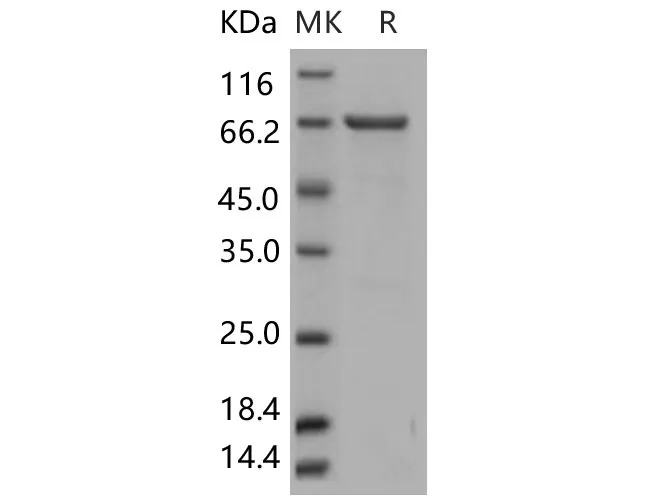Recombinant Human MEK2/MAP2K2/MKK2 Protein (GST Tag)
CAT:
763-PKSH031494
Size:
50 µg
Price:
Ask
- Availability: 24/48H Stock Items & 2 to 6 Weeks non Stock Items.
- Dry Ice Shipment: No




Recombinant Human MEK2/MAP2K2/MKK2 Protein (GST Tag)
- Background: Dual specificity mitogen-activated protein kinase kinase 2, also known as MAP kinase kinase 2, MAPKK2, ERK activator kinase 2, MAPK / ERK kinase 2, MEK2 and MAP2K2, is a member of the protein kinase superfamily, STE Ser/Thr protein kinase family and MAP kinase kinase subfamily. MAP2K2 / MEK2 contains oneprotein kinase domain. MEK1 and MEK2 (also known as MAP2K1 and MAP2K2, respectively) are evolutionarily conserved, dual-specificity kinases that mediate Erk1 and Erk2 activation during adhesion and growth factor signaling. MAP2K1 / MEK1 is a crucial modulator of Mek and Erk signaling and have potential implications for the role of MEK1 and MEK2 in tumorigenesis. MAP2K2 / MEK2 catalyzes the concomitant phosphorylation of a threonine and a tyrosine residue in a Thr-Glu-Tyr sequence located in MAP kinases. It also activates the ERK1 and ERK2 MAP kinases. Defects in MAP2K2 are a cause of cardiofaciocutaneous syndrome (CFC syndrome) which is characterized by a distinctive facial appearance, heart defects and mental retardation. Heart defects include pulmonic stenosis, atrial septal defects and hypertrophic cardiomyopathy.
- Synonyms: CFC4, FLJ26075, MAPKK2, MEK2, MKK2, PRKMK2
- CAS Number: 9000-83-3
- UniProt: P36507
- Accession Number: NP_109587.1
- Host: Baculovirus
- Origin Species: Human
- Tag: N-GST
- Sequence: Met 1-Val 400
- Field of Research: Signal Transduction;Cancer;
- Purity: > 92 % as determined by reducing SDS-PAGE.
- Bioactivity: Not validated for activity
- Reconstitution: Please refer to the printed manual for detailed information.
- Molecular Weight: 66 kDa
- Shipping Conditions: This product is provided as lyophilized powder which is shipped with ice packs.
- Storage Conditions: Generally, lyophilized proteins are stable for up to 12 months when stored at -20 to -80°C. Reconstituted protein solution can be stored at 4-8°C for 2-7 days. Aliquots of reconstituted samples are stable at < -20°C for 3 months.
